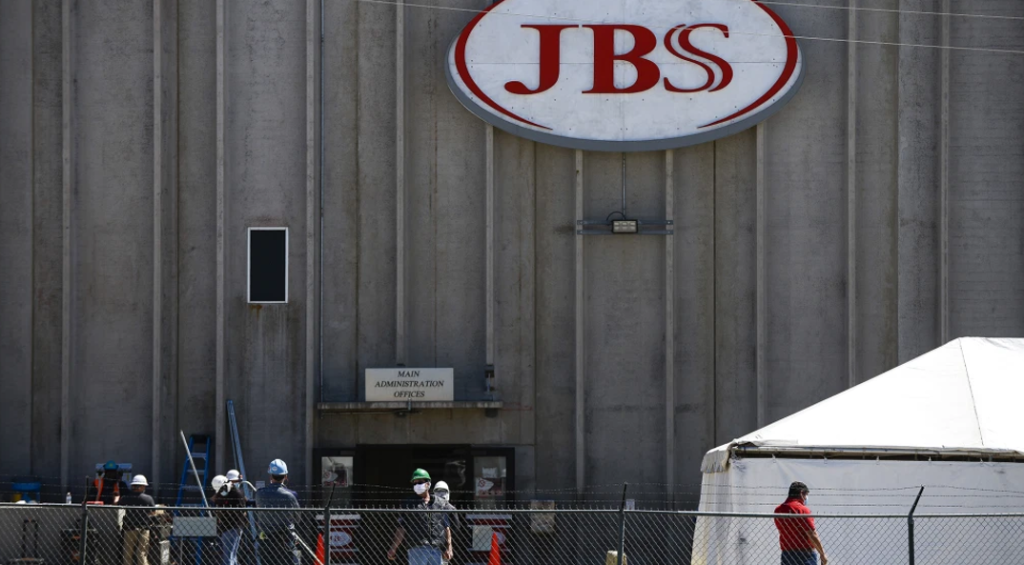A cyberattack on JBS SA, the world’s largest meat producer, forced the closure of all of its U.S. meat plants, wiping out production from facilities that supply nearly a quarter of U.S. supplies. All of the company’s beef and regional plants were forced to close, and all other JBS meatpacking plants in the country experienced some level of disruption in operations, according to an official with the International Union of United Food and Commercial Workers.
JBS did not immediately respond to a request for comment. The union represents workers at the company’s U.S. plants. Slaughter operations in Australia also declined, according to a trade group, and one of Canada’s largest beef plants went dormant. That comes after a weekend attack on the Brazilian company’s computer networks, according to JBS posts on Facebook, unions and employees.
It’s unclear exactly how many plants around the world have been affected by the ransomware attack, as Sao Paulo-based JBS has yet to release those details. The prospect of more extensive closures around the world is already disrupting agricultural markets and raising concerns about food security as hackers increasingly target critical infrastructure. Livestock futures plummeted, while pork prices rose.
American Meat Giants
Hackers now have the commodity industry in their sights with the JBS attack that came just three weeks after Colonial Pipeline Co., operator of the largest U.S. pipeline, Targeted a ransomware attack. It also happened as the global meat industry struggles with prolonged Covid-19 absenteeism after recovering from last year’s outbreaks that saw plants closed and supplies disrupted.
The White House offered assistance to JBS after the company notified the Biden administration on Sunday of a cyberattack by a criminal organization likely based in Russia, White House Deputy Press Secretary Karine Jean-Pierre told reporters.
There have been more than 40 publicly reported ransomware attacks against food companies since May 2020, said Allan Liska, senior security architect at cybersecurity analytics firm Recorded Future. JBS suspended its North American and Australian computer systems on Sunday after an organized assault on some of its servers, the company said in a statement monday. Without commenting on the plant’s operations, JBS said the incident may delay certain transactions with customers and suppliers.
“Beef retailers and processors are coming off a long weekend and need to catch up on orders,” Steiner Consulting Group said in its Daily Livestock Report. “If they suddenly get a call saying that the product may not be delivered tomorrow or this week, it will create very significant challenges in keeping the plants running, and the retail case stocked.”
Grocery stores
The impact on meat prices at the grocery store may not be immediately apparent. Retailers don’t always like to raise prices to consumers and may try to resist, according to Michael Nepveux, an economist at the American Farm Bureau Federation. “How long it lasts will affect the level at which consumers start seeing something in grocery stores,” he said in a phone interview.
President Joe Biden ordered his administration to do everything it could to mitigate the impact on the meat supply. “Attacks like this highlight vulnerabilities in the security of our nation’s food supply chain and underscore the importance of diversifying the nation’s meat processing capacity,” said Sen. John Thune of South Dakota, the Senate’s second Republican leader. Any substantial disruption in meat processing would further stoke growing political concerns about meat industry concentration and complaints from the four giant companies that control more than 80% of U.S. beef processing.
They unfairly harness their power over farmers and consumers. Read more: Ranchers’ anger at ‘red line level’ as packers profit from beef JBS is the first beef producer in the U.S., And it accounts for 23% of the country’s maximum capacity compared to rival Tyson Foods Inc.’s 22% share. , according to a Tyson investor report. JBS accounts for about one-fifth of pork capacity. JBS closed beef processing facilities in Utah, Texas, Wisconsin and Nebraska and canceled shifts at the Iowa and Colorado plants on Tuesday, according to union officials and employees.
In Canada, an Alberta processing plant was expected to resume operations this afternoon after being idle since Monday, a union spokesman said. Pork and chicken facilities, including one in Minnesota, were also closed by the owner of Pilgrim’s Pride Corp., the second-largest chicken producer in the United States, union officials and employees said. At least five of the six U.S. swine facilities They were cutting operations on Tuesday, according to Facebook posts from those plants. William Callicott, president of the Mid-Atlantic Local Food Inspection Council, AFGE, said at least two Pilgrim’s Pride poultry plants in Chattanooga, Tennessee, were shut down due to the cyberattack.
Meat markets run out of key prices in the U.S. After the cyberattack on JBS
“There are at least 10 plants that I am aware of that have suspended operations because of the cyberattack,” said Paula Schelling-Soldner, acting chair of the national council of locals representing food inspectors from the American Federation of Government Employees. She declined to identify the locations. UFCW International President Marc Perrone, whose union represents more than 25,000 JBS meatpacker employees, called on the company to “ensure that all of its meatpacking workers receive their guaranteed contract wages as these plant closures continue.”
There were some initial signs of restart. JBS’s beef processing facility in Brooks, Alberta, resumed operations Tuesday afternoon, according to Scott Payne, spokesman for United Food and Commercial Workers Canada Union Local Union 401. Chicago cattle futures plunged as much as 3.4% on Tuesday, before cutting losses. Slaughterhouse closures exacerbated the existing oversupply of animals. In the noon reports from the U.S. Department of Agriculture For beef and pork, they did not disclose prices due to “packager presentation issues.” However, the CME Group’s pork futures contract increased by more than 3.5%. The amount of cattle slaughtered in the U.S. It fell 22% from the previous week, while pigs were down 20%, according to USDA estimates. JBS has facilities in 20 countries.
The United States accounts for half of the company’s revenue, while Australia and New Zealand account for 4% and Canada 3%, according to corporate data. Brazilian plants are operating normally, a JBS spokesman said by phone on Tuesday.
Backup servers well
Backup servers were not affected, and the company is working to restore systems as soon as possible, according to a Monday statement from JBS USA. JBS shares rose 2.3% on Tuesday in Sao Paulo, beating the 1.6% gain of Brazil’s benchmark Ibovespa index. JBS is Australia’s largest food and meat processor with a portfolio of branded beef, lamb, pork and value-added products, according to its website.
It exports to more than 50 countries, and its Dinmore plant is the largest meat plant in the Southern Hemisphere. Still, the shutdown is a big concern for exports if prolonged, said Matt Dalgleish, manager of commodity market information at Thomas Elder Markets, noting that Australia ships between 70% and 75% of red meat products from sheep and cattle overseas. “Given the size of JBS globally, if they were offline for more than a week, we will surely see disruptions in supply chains,” he said.
JBS USA Cyberattack Press Statement – June 9
JBS USA confirmed today that it paid the equivalent of $11 million in ransom in response to the criminal attack on its operations. At the time of payment, the vast majority of the company’s facilities were operational. In consultation with in-house IT professionals and third-party cybersecurity experts, the company made the decision to mitigate any unforeseen issues related to the attack and ensure that no data was leaked. “This was a very difficult decision for our company and for me personally,” said Andre Nogueira, CEO of JBS USA. “However, we felt this decision needed to be made to prevent any potential risks to our customers.” The FBI stated that this is one of the most specialized and sophisticated cybercriminal groups in the world.
JBS USA’s ability to quickly resolve problems resulting from the attack was due to its cybersecurity protocols, redundant systems, and encrypted backup servers. The company spends more than $200 million a year on IT and employs more than 850 IT professionals worldwide. JBS USA has maintained constant communication with government officials throughout the incident. Third-party forensic investigations are still ongoing, and no final determinations have been made. The results of the preliminary investigation confirm that no company, customer or employee data was compromised.
Source: Link




Get Involved & Participate!
Comments